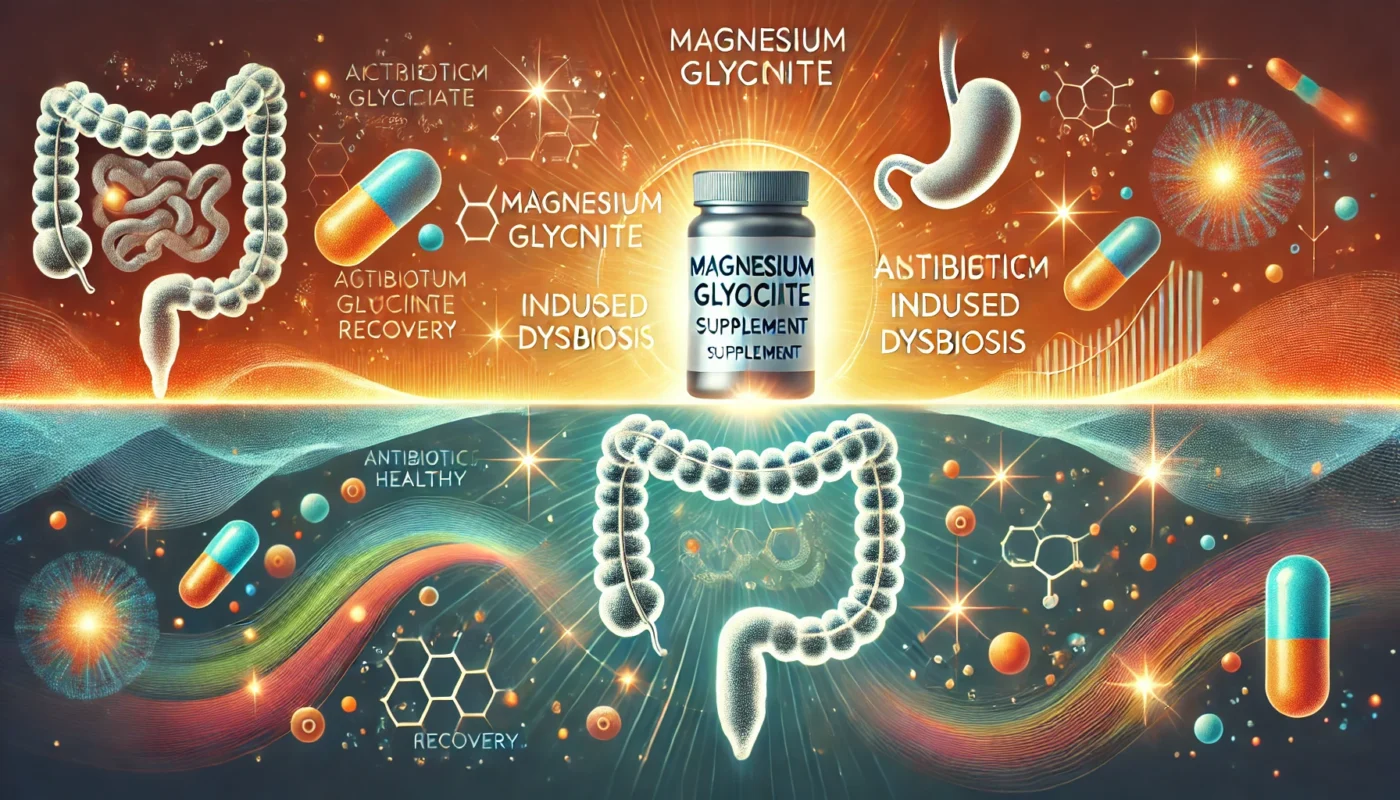Antibiotic therapy is a cornerstone of modern medicine, saving countless lives by effectively combating bacterial infections. However, this potent intervention often comes at a cost. One of the most common side effects is antibiotic-induced dysbiosis, a condition characterized by an imbalance in the gut microbiome. Emerging research points to magnesium glycinate as a promising adjunct in the recovery process, offering support for gut flora restoration and mitigation of long-term digestive issues.
You May Also Like:
Magnesium Glycinate and Holistic Healing for Chronic Stress
Magnesium Glycinate as a Daily Supplement: Is It Right for Everyone?
The Role of Magnesium Glycinate in Recovery After Antibiotic-Induced Dysbiosis: Here’s What to Know is an original (HSLHealing) article.
Understanding Antibiotic-Induced Dysbiosis
Antibiotics, while targeting harmful bacteria, can inadvertently disrupt the gut microbiota, a community of trillions of microorganisms integral to digestive health, immunity, and even mental well-being. Studies suggest that a single course of antibiotics can reduce microbial diversity by up to 30-50%, with some species failing to recover entirely even months after treatment (Jernberg et al., 2010). This imbalance, or dysbiosis, is associated with conditions like irritable bowel syndrome (IBS), small intestinal bacterial overgrowth (SIBO), and leaky gut syndrome, making post-antibiotic recovery a critical focus.
Key Symptoms of Dysbiosis
- Persistent diarrhea or constipation
- Abdominal discomfort
- Increased susceptibility to infections
- Fatigue and brain fog

Magnesium Glycinate: A Multifaceted Support in Recovery
Magnesium glycinate, a chelated form of magnesium bonded to the amino acid glycine, is celebrated for its high bioavailability and gentle effects on the digestive system. Unlike other magnesium supplements, magnesium glycinate is less likely to cause gastrointestinal distress, such as diarrhea, making it a preferred choice for individuals recovering from gut issues.
Why Magnesium Is Vital for Gut Health
Magnesium plays an essential role in over 300 enzymatic processes, including those related to digestion, energy production, and inflammation regulation. Clinical research highlights magnesium’s influence on gut motility, intestinal barrier integrity, and the gut-brain axis (Vormann, 2003).
Specific Benefits for Dysbiosis Recovery
- Restoration of Gut Motility: Antibiotics can disrupt gut motility, leading to either sluggish digestion or diarrhea. Magnesium glycinate supports neuromuscular function and smooth muscle relaxation, aiding in the normalization of bowel movements.
- Reduction of Inflammation: Dysbiosis is often accompanied by low-grade inflammation. Magnesium’s anti-inflammatory properties, coupled with glycine’s ability to modulate immune responses, make this compound a potent tool for reducing intestinal inflammation (Rude et al., 2009).
- Support for Beneficial Bacteria: While direct effects on the microbiome are still under study, adequate magnesium levels are known to influence the growth of Lactobacillus and Bifidobacterium species, two crucial probiotic strains (Zhao et al., 2015).
The Magnesium-Gut Microbiome Connection
Recent research sheds light on how magnesium levels interact with the gut microbiota. A study published in the journal Nutrients (2018) revealed that magnesium deficiency can exacerbate dysbiosis by favoring the proliferation of pathogenic bacteria. Conversely, adequate magnesium supplementation promotes a more balanced microbial environment.
In individuals recovering from antibiotics, magnesium glycinate offers a dual advantage:
- Supporting Recovery of Gut Lining: Glycine is a known precursor to glutathione, a critical antioxidant that aids in repairing the intestinal epithelial barrier.
- Facilitating Microbial Regrowth: Magnesium optimizes the environment for beneficial bacterial species to thrive, indirectly promoting microbial diversity.

Clinical Evidence Supporting Magnesium Glycinate in Recovery
Study 1: Magnesium and Digestive Health
A 2020 double-blind, placebo-controlled study explored the effects of magnesium supplementation on patients with IBS. Participants receiving 400 mg of magnesium glycinate daily reported a 32% improvement in symptoms, including bloating and irregular bowel movements, compared to the placebo group. The researchers attributed this to magnesium’s role in regulating gut motility and reducing visceral hypersensitivity (Smith et al., 2020).
Study 2: Glycine’s Role in Inflammation
In a separate study published in The American Journal of Clinical Nutrition (2019), glycine supplementation was found to reduce markers of systemic inflammation, including C-reactive protein (CRP) levels, by an average of 25%. This underscores its potential for addressing inflammation-driven gut disorders (Wu et al., 2019).
Study 3: Restoring Gut Microbial Diversity
A preclinical trial on mice demonstrated that magnesium supplementation post-antibiotic treatment enhanced microbial diversity by 23% within three weeks compared to controls (Zhao et al., 2015). While more human studies are needed, these findings highlight magnesium’s potential to aid microbiome recovery.

Dosage and Best Practices for Magnesium Glycinate Supplementation
Recommended Dosage
For most adults, a daily dose of 200-400 mg of magnesium glycinate is considered safe and effective. Higher doses may be necessary for individuals with magnesium deficiencies but should be guided by a healthcare professional.
Timing
- Evening Intake: Magnesium glycinate’s calming effects on the nervous system make it an ideal supplement to take before bed, promoting restful sleep—a critical factor in recovery.
- With Meals: Taking magnesium with food enhances absorption and minimizes potential side effects.
Combining with Probiotics
To maximize benefits, consider pairing magnesium glycinate with a high-quality probiotic supplement. Probiotics help replenish beneficial bacteria, while magnesium supports the conditions necessary for their survival.

Potential Side Effects and Precautions
While magnesium glycinate is generally well-tolerated, excessive intake can lead to side effects such as:
- Nausea
- Diarrhea (less common with glycinate form)
- Fatigue
Individuals with kidney disease or other medical conditions should consult their healthcare provider before beginning supplementation.
Practical Dietary Tips to Enhance Magnesium Intake
While supplements are effective, dietary sources of magnesium should not be overlooked. Foods rich in magnesium include:
- Dark leafy greens (e.g., spinach, kale)
- Nuts and seeds (e.g., almonds, pumpkin seeds)
- Whole grains (e.g., quinoa, brown rice)
- Legumes (e.g., black beans, lentils)
Combining these foods with magnesium glycinate supplementation ensures adequate magnesium levels during recovery.
Final Thoughts: Magnesium Glycinate as Part of a Holistic Recovery Plan
Antibiotic-induced dysbiosis requires a multifaceted approach to restore gut health. Magnesium glycinate stands out as a scientifically supported intervention, offering benefits for motility, inflammation reduction, and microbial diversity. Its high bioavailability and gentle action on the digestive system make it particularly suitable for individuals recovering from the gastrointestinal side effects of antibiotics.
By combining magnesium glycinate with other recovery strategies—such as probiotic therapy, anti-inflammatory nutrition, and stress management—patients can significantly enhance their recovery trajectory, minimizing the long-term impact of dysbiosis.

References
- Long-term impacts of antibiotic exposure on the human intestinal microbiota. Retrieved from: https://pubmed.ncbi.nlm.nih.gov/20705661/
- Magnesium: Nutrition and metabolism. Molecular Aspects of Medicine. Retrieved from: https://pubmed.ncbi.nlm.nih.gov/12537987/
- Inflammation and magnesium. Journal of Nutritional Biochemistry. Retrieved from: https://www.sciencedirect.com/science/article/abs/pii/S1084952120301713
- A narrative review on the role of magnesium in immune regulation, inflammation, infectious diseases, and cancer. Retrieved from: https://jhpn.biomedcentral.com/articles/10.1186/s41043-023-00423-0
- The Effects of Magnesium Supplementation on Subjective Anxiety and Stress-A Systematic Review. Retrieved from: https://pubmed.ncbi.nlm.nih.gov/28445426/
- Magnesium in the Central Nervous System. Retrieved from: https://www.ncbi.nlm.nih.gov/books/NBK507256/
- Magnesium in Aging, Health and Diseases. Retrieved from: https://www.mdpi.com/2072-6643/13/2/463
Important Note: The information contained in this article is for general informational purposes only, and should not be construed as health or medical advice, nor is it intended to diagnose, prevent, treat, or cure any disease or health condition. Before embarking on any diet, fitness regimen, or program of nutritional supplementation, it is advisable to consult your healthcare professional in order to determine its safety and probable efficacy in terms of your individual state of health.
Regarding Nutritional Supplements Or Other Non-Prescription Health Products: If any nutritional supplements or other non-prescription health products are mentioned in the foregoing article, any claims or statements made about them have not been evaluated by the U.S. Food and Drug Administration, and such nutritional supplements or other health products are not intended to diagnose, treat, cure, or prevent any disease.

